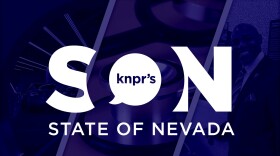Las Vegas has seen almost two years of monthly gaming revenue records, previously unseen numbers at Reid International Airport, and if you walk into a casino right now? It’s wall-to-wall people almost every night of the week.
The world of gambling, gaming and casinos is continuing to grow. And we’re going to be taking more regular looks at the industry.
Last year, or one year since the start of a global pandemic, was a record gaming revenue year in Nevada. This year is looking similar, said Nevada Independent gaming reporter Howard Stutz.
He told State of Nevada producer Mike Prevatt the most notable departure of the Las Vegas Strip was Sands, which sold the Venetian and Palazzo properties.
“The most interesting change,” he said, “is the real estate investment trusts (REITs) coming in, buying most of the Strip and then leasing the properties back – the largest being VICI.” The company owns 10 properties on the Las Vegas Strip.
There’s been about 20 straight months of billion-dollar revenue in Las Vegas. Hotel rates are high, and passenger numbers through Reid were at their highest in October at 5.17 million passengers.
Outside of the Strip, Stutz said Circa and Golden Nugget are big draws in downtown Las Vegas, and the Plaza is undergoing a renovation. Henderson, since the pandemic, lost the Fiesta hotel-casino, and in the east valley, Eastside Cannery has yet to reopen.
'Unheard of years ago'
Next year, Stutz said Fontainebleau is expected to open, but there’s even more exciting plans in the city’s future.
“The challenge for 2023 for the gaming industry is going to be matching the revenue totals figures that we've seen in 2022. Now, we should see an uptick in convention business. The aspect of sports has really shown its mettle in 2022 with the Raiders and the use of Allegiant Stadium at different events there have drawn big crowds. Next year, in 2023, will have the Formula 1 race, all that folds into 2024 in the Super Bowl.”
In 2028, Las Vegas is set to host the NCAA Men’s Final Four. “That was unheard of years ago,” Stutz said. “The Super Bowl coming here in 2024, also unheard of.”
So what are visitors seeing? Gambling deals still exist, but they’re harder to come by, according to Anthony Curtis, the publisher of Las Vegas Advisor.
“You go to places like Ellis Island or Emerald Island in Henderson, or the downtown places: the Plaza, Downtown Grand, you're gonna find lower limits, so they can find them. But on the Strip, forget it, you got no chance,” he said. “People love gambling, they love Vegas, and this pent-up demand thing … I hated the phrase, I couldn't stand it. But it's sure true. People are still getting on and coming to Vegas. This is a place they come to party, and they want a party.”
“The awful phrase pent-up demand also must be accompanied with pent-up money and that money may be running dry finally,” gaming reporter and Las Vegas Advisor David McKee added. “The hotel rates were, as you noted, at their highest level in October, but that also was a month that saw gaming spend in Las Vegas flattened year over year.”
Curtis told State of Nevada host Joe Schoenmann that relatively, Las Vegas is a good value compared to other major cities.
“Thirty years ago, you could get $3 and $5 steaks and that sort of thing. And now, $9.99 for a steak dinner is an unbelievable bargain,” Curtis said.
John, who declined to use his last name, is a poker dealer who called into the program on Wednesday. He said tipping is the main source of his income, but tips are down to an average of $1 per hand. Many of his colleagues have gone to other cities where tipping is higher.
“I've also been considering switching careers even from dealing poker to maybe jumping into real estate,” he said. “That's gonna pay a lot more money than what I'm making now.”
‘We want to enjoy ourselves while we can’
If a recession was coming, Las Vegas would already be feeling it, according to Amanda Belarmino, an assistant professor with UNLV's hospitality college.
“We'd already see decreases in travel throughout the country and decreases in gaming spending. We're not seeing that, but what we are seeing, people aren't subscribing to their streaming services anymore. … We're seeing decreases in the quantity of consumer goods that are being purchased. … While we do all hate the idea of pent-up demand, I think that the better term is really, we have a shear trauma from the pandemic. I think we're all afraid of what's going to be around the corner next. We want to enjoy ourselves while we can. It's kind of an eat, drink and be merry.”









